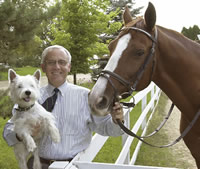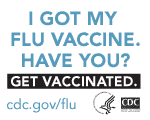
Lonnie King is the Director of the National Center for Zoonotic Vector-borne, and Enteric Diseases in the Coordinating Center for Infectious Diseases. Previously King was the first director for CDC's Office of Strategy and Innovation. Before coming to CDC, he was dean of the College of Veterinary Medicine, Michigan State University.
Lonnie J. King, DVM
Director of the National Center for Zoonotic, Vector-Borne, and Enteric Diseases (ZVED)"We are in a new era of emerging and reemerging zoonotic diseases. Episodes of emerging zoonoses are increasingly recognized around the world and the confluence of people, animals, and animal products today is unprecedented. Our center recognizes the inextricable link between humans, animals, and the environment." -- Dr. Lonnie J. King
Dr. Lonnie J. King is the Director of the National Center for Zoonotic, Vector-Borne, and Enteric Diseases (ZVED) – a center that became organized at CDC in March 2006 and officially approved March 22, 2007. ZVED strives for domestic and global public health through the elimination, prevention, and control of disease, disability, and death caused by zoonotic, vectorborne, foodborne, waterborne, mycotic, and related infections.
“My training and background is as a veterinarian; veterinary medicine is one of the public health professions. I have been very involved in food safety and security, emerging diseases, new zoonoses, and bioterrorism. My background has given me a solid understanding of population and herd health. My training in epidemiology has helped me develop expertise in disease transmission, ecosystems, and statistics. I’ve spent a number of years working on national animal disease eradication campaigns, national and global emergencies, and have worked closely with diagnostic laboratories, and diverse academic and government research communities. Preventive medicine is second nature to me, and I consider myself a health practitioner first and foremost, but have just focused on other species. The principles and science that underpin public health are fundamental to my education and experience as a veterinary medical officer and practitioner.”

As a veterinarian it's no surprise that King is an animal lover. His dog is a West Highland terrier named Coogee. "That's an Australian aboriginal name which means stinky seaweed," he explains, eyes twinkling. He also has a Dutch warmblood horse named Brady who is a dressage horse.
Before coming to National Center for Zoonotic, Vector-Borne, and Enteric Diseases, Dr. King served as the first director of CDC’s Office of Strategy and Innovation (OSI). In 2006, Dr. King became a new member of the FDA Scientific Board. He was dean and professor of the College of Veterinary Medicine, Michigan State University, roles he took on in 1996. Before that, he dedicated 20 years of his career to the United States Department of Agriculture. As Administrator for the Animal and Plant Health Inspection Service, he provided executive leadership and direction for ensuring the health and care of animals and plants, to improve agricultural productivity and competitiveness, and to contribute to the national economy and public health. During that period, Dr. King also served as the country’s chief veterinary officer for five years and worked extensively in global trade agreements within NAFTA and the World Trade Organization. He believes that much of his administrative and leadership experiences in these roles are directly applicable to his new responsibilities as a Center Director. His past experiences include work with organizational change, visioning, and futuring during his tenure in government and academe.
Dr. King served as a consultant and member of the Board of Scientific Counselors to the former National Center for Infectious Diseases. He was elected as a member of the Institute of Medicine of The National Academies in 2004, is a member of the Institute of Medicine’s Committee on Microbial Threats to Health, editor for the OIE (World Organisation for Animal Health) Scientific Review on Emerging Zoonoses, and is President of the American Veterinary Epidemiology Society. He currently also serves as Chair for the OIE Ad Hoc Committee on Emerging Zoonoses.
Before beginning his government career in 1977, Dr. King was in private veterinary practice for seven years in Dayton, Ohio, and Atlanta, Georgia . His assignments included field veterinary medical officer in Georgia and station epidemiologist in Texas . He spent five years in Hyattsville , Maryland, in staff assignments in Emergency Programs, as well as Animal Health Information. While in Hyattsville, Dr. King directed the development of the agency's National Animal Health Monitoring System. He left APHIS briefly to serve as the Director of the Governmental Relations Division of the American Veterinary Medical Association in Washington, DC, and served as the lobbyist for the AVMA on Capitol Hill. From 1988 to 199, King was the Deputy Administrator for Veterinary Services. In that position he was responsible for directing national veterinary and animal health programs, including the National Veterinary Services Lab and Plum Island Animal Disease Center.
A native of Wooster, Ohio, Dr. King earned a Bachelor of Science and Doctor of Veterinary Medicine from the Ohio State University in 1966 and 1970, respectively. He subsequently earned a Master of Science Degree in Epidemiology from the University of Minnesota and a Master in Public Administration from American University in Washington, DC, in 1991. King is a board-certified member of the American College of Veterinary Preventive Medicine, and he has completed the Senior Executive Fellowship program at Harvard University.
Page last modified: June 12, 2007

